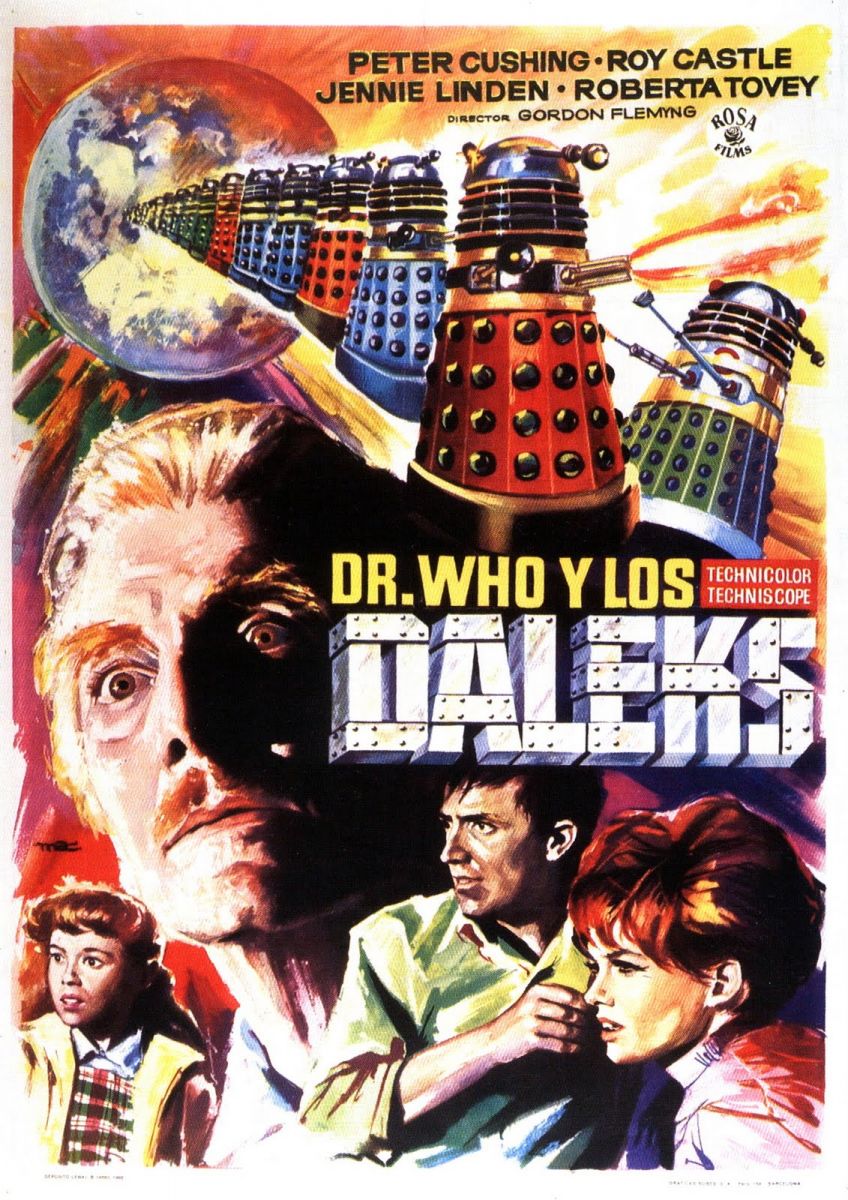A Little Adjustment
AJ Robinson

Did you know Doctor Who is human? For those readers who are fans of that television series I know what you’re thinking: blasphemy. And you’re right, it is. Here’s the thing, back in 1965, there was a movie called, Dr Who and the Daleks.
The storyline changes.
Although it was based on the television series, the filmmakers made some changes to the overall storyline. One key change was turning the Doctor into a befuddled old scientist on Earth who lives with his granddaughters, Susan and Barbara. He invents a time and space machine that he calls the TARDIS; together with Ian, boyfriend of Barbara, they go off on an adventure where they end up fighting Daleks.
Sounds kind of familiar, right? So, why the change? Well, the producers of the movie were concerned that Doctor Who was, at that time, a bit too obscure a series to be widely known, especially in the United States.
The show had only been on the air for three years at that point. That meant Americans would not understand the concept of him being a Time Lord, two hearts, Gallifrey and all the rest. They also hoped that the U.S. would provide the lion’s share of the profits from the film’s release.
They had a choice: changes or exposition. The latter seemed like a real killjoy for the movie. It would necessitate a scroll or a great deal of narrative, maybe even both.
Making Dr Who human.
Although a scroll can work, witness the Star Wars films and other movies, it hadn’t been used much back then. The producers didn’t want to do that. On the other hand, if they simply made him human, presto, everything else fell into place.
Hence the change. Now, I most definitely do not accept it in terms of the overall series. I can still enjoy a non-canon story.
Peter Cushing was a good Doctor Who. I see similar situations arise in various recent films. Quite often when adapting a book, most especially a sci-fi or fantasy story, you face the problem of explaining a complex setup to your audience.
Conversely, you have a story that you know your fan base is well-acquainted. Thus, you don’t feel the need to explain much at all. Either way can lead to trouble in a movie.
The Vampire Academy series of books covers a world with full rich characters, plots and relationships. Sadly, when brought to the big screen much of that was lost and narration by one of the main characters did not help. On the other hand, making it into a series worked much better.
We see the same with Dune. One movie did not work, a series worked; the latest movie made a point of not trying to include the entire first book. Too long, too big and far too complex.
My daughter loved the book The Giver. She didn’t care for the movie. Again, too much voiceover narrative was needed to explain the intricate world the people lived in.
On the other hand, consider a movie such as Ghost in the Shell. That story started as a manga, became an anime film with multiple versions and sequels and only then was it made into a live-action movie. Although the film did use a brief scroll at the start to establish the basic premise, other areas were rather ignored or just glossed over and that weakened the story.
Still, fans loved seeing the spider tank; they knew what to expect. Non-fans were caught off guard, as nothing was previously established, which meant it was awesome to see, but they had no understanding of its abilities and limitations. When Major pounds on the hatch fans knew what she was doing. Not anyone else.
I strive to think of what is ahead.
As a writer, I think the fact I’ve written television and movie scripts and books has helped. That’s why I thought to write on this subject. My hope is that other writers might learn from this lesson and, thus, can improve the movies we see in the coming years. After all, our movies could do with a little boost.
Combining the gimlet-eye of Philip Roth with the precisive mind of Lionel Trilling, AJ Robinson writes about what goes bump in the mind, of 21st century adults. Raised in Boston, with summers on Martha's Vineyard, AJ now lives in Florida. Working, again, as an engineeer, after years out of the field due to 2009 recession and slow recovery, Robinson finds time to write. His liberal, note the small "l," sensibilities often lead to bouts of righteous indignation, well focused and true. His teen vampire adventure novel, "Vampire Vendetta," will publish in 2020. Robinson continues to write books, screenplays and teleplays and keeps hoping for that big break.
- Squirrel Blitzkrieg
- No Conscious, No Legacy
- A Story of Ralph
- 18 Candles
- Closing the Door
- The Empty Picture
- Determination
Click above to tell a friend about this article.
Recommended
- David Simmonds
- The Vice Index
- Tastes as Cardboard
- Concert in Central Park

- Sjef Frenken
- How Do You Say
- Serving Dogs and Cats
- Paying at the Pump

- Jennifer Flaten
- Gardening 2011
- Gilbert Got Fried
- Sniffles

- M Alan Roberts
- Sea Stories 3
- Brain Abusers
- Learning to Live

Recommended
- Matt Seinberg
- At Their Mercy
- Birthday
- Sklar Rocked America

- JR Hafer
- Rosko
- Why and Wherefore
- Fantasy of Flight

Recommended
- AJ Robinson
- The Barometer
- My New Office
- Vaccination

- Jane Doe
- Char-broil 480
- Speak Now
- By the Way

- M Adam Roberts
- Learning to Fly
- Son of a Gun
- Thanks a Million

- Ricardo Teixeira
- Monkey Business
- Harmony
- There is a Light




